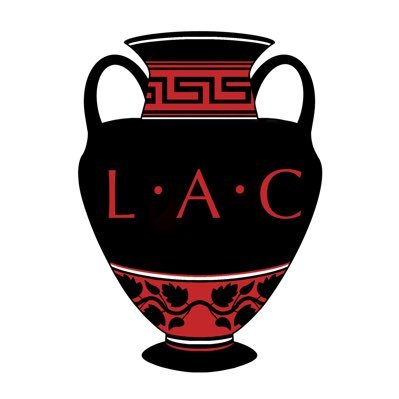
Grǣġhama
@grahamscheper
Followers
4K
Following
1K
Media
222
Statuses
940
Graham Scheper - Medievalist studying Old English (BA: @UofMaryland) and Latin literature
Joined November 2023
After the sack of Rome, against allegations that the empire was falling due to the rise of Christianity, St. Augustine of Hippo wrote 22 books in defense of the faith, titled “The City of God Against the Pagans”. I break this fascinating work down here: https://t.co/O5ks3MpX55
2
4
64
When Dutch settlers first saw pumpkins, they applied the diminutive suffix (-kin) to their word for melon, which was pompion, being ultimately from Greek πέπων. If the Greeks had discovered pumpkins, we would be calling them πέπωνῐ́δῐᾰ or “peponidia” (little melons) instead.
9
10
156
This is definitely some of the most fun we have ever had on stream! Highly recommend you watch for both your Latin and entertainment! We play the game PEAK entirely in Classical Latin! https://t.co/PB800iG5Bb
@grahamscheper
1
2
6
It’s unclear what the Old English word for “kitten” was. If there was one, we don’t seem to have it anymore. Our word “kitten” almost definitely comes from Old French “chaton”, and dialectical “kitling” is from Old Norse “ketlingr”. Maybe it was something like *cetċen, cognate
4
5
129
We are delighted to announce that Andrew Breeze's new book, "King Arthur: Medieval British Literature & Modern Critical Tradition," is now published and available worldwide. Check it out! Visit: https://t.co/iVUlyncpe1
2
10
26
In the Old English poem Widsith, we are told that the Finns are ruled by "Cęlic", who is taken to be Kalevi, an important mythological figure in the Kalevala and the Kalevipoeg. Evident familiarity with Finnish mythology is one piece of evidence which suggests Widsith to
4
24
253
The Beowulf manuscript is really fascinating and unique in many ways, but for the untrained eye it’s difficult to read. In today’s video, I walk through how to read this manuscript, and together we read the first folio. Check it out: https://t.co/8NA8XjLJh1
1
19
128
The word “groom” used to simply mean “man” (Old English “guma”, cognate with Latin “homo”). There was the brȳd (the bride), and the brȳdguma (the bride-man). Over time, the word “guma” fell out of use entirely, and by Middle English the second element was reinterpreted as
7
19
179
My friends Holly and Cori have started putting out great resources on Youtube for learning Latin. Holly’s videos focus more on brand-new learners, while Cori’s focus more on classical literature. Highly recommend both! Holly: https://t.co/ClfrevJSqQ Cori: https://t.co/Bur5gvWw8A
0
9
54
There was no distinct word for a “husband” or a “wife” in Old English; to refer to one’s spouse most commonly people simply said “my man” (mīn ċeorl / mīn wer) or “my woman” (mīn wīf), the semantic habit of which survives today. As “wīfmann” (lit. ‘woman+person’) came to be the
22
37
378
“If one were looking for a man who could not read Vergil but his father could, he might be found more easily in the twentieth century than in the fifth.” - C. S. Lewis
2
15
194
Old English had many words for “wave”. Three are ȳþ (🇮🇸 unnur), hærn (🇮🇸 hrönn), and wǣġ (🇳🇱 waag). Tōdæġ iċ lōcode on þās ȳða. Today I gazed on these waves.
2
12
107
A forest in Old English was usually called either a wudu or a holt. Wudu is where we get the word “wood” from, and holt (which was more poetic and less common) generally only survives in place names. You’ll also occasionally see trēow used, which is where “tree” comes from.
19
51
386
10k subs Q&A is out! I couldn’t get to every question but thanks go to everyone who has helped me get here. Topics include: how to learn medieval languages, what books have influenced me, and what the OE word “wyrd” means. Check it out: https://t.co/5OztaV2KWT
1
6
41
The Anglo-Saxon Poetic Records was a six-volume anthology of Old English poetry, published from 1931-53. Contained within these six volumes is every single one of the 30,000 surviving lines of Old English poetry! They are pretty outdated though, and several scholars, notably RD
15
51
519
Today I sat down with Jackson Crawford to talk about his new edition of the Poetic Edda. Check it out here: https://t.co/hTAgvvpF3d
4
8
82
It might be spelled <Freanday> in Modern English in this hypothetical, like the word “beam”, but similarly to beam it would have the quality of that bee/we/me vowel, which in IPA is represented with [i:].
1
0
29
In our interview (which releases tomorrow), Jackson Crawford helpfully corrects me on a common misconception: “Friday” is not named after the goddess Freya (OE *Frēa), but actually after the goddess Frigg (OE Frīġe). If it were named after Freya, in MnE it would be “Freenday”.
4
5
85


